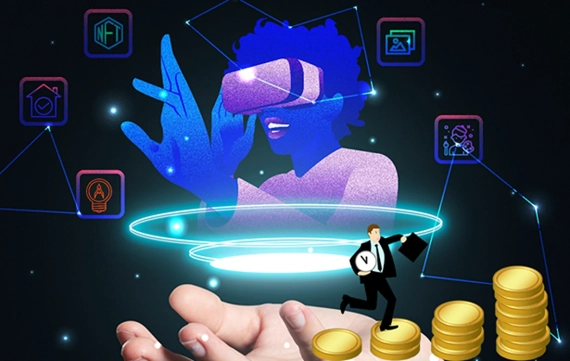Table of Contents
Gaming has undergone significant evolution in recent times, progressing from basic 2-bit games to more intricate 8-bit, 32-bit, and 64-bit versions, culminating in hyper-realistic games that blur the line between virtual and reality. This transformation has democratized gaming, attracting players from all walks of life, including corporate executives, and has emerged as a lucrative industry, surpassing the realms of movies and sports combined. However, the question remains: has the gaming industry peaked, or are there more groundbreaking developments on the horizon? Let’s delve deeper to explore the future of gaming.
Gaming and AI
The integration of Artificial Intelligence (AI) in gaming has a long history, from memorable game NPCs like Reptile in Mortal Kombat to the sophisticated AI mechanisms used in character and environment generation. The advent of generative AI has revolutionized game design by expediting the creation process. While the potential for AI to autonomously develop entire games exists, current capabilities are not yet at that level.
AI’s role in gaming extends to AI-generated art, a burgeoning field that holds promise for enhancing graphical elements in games. Moreover, initiatives led by game designers and researchers, such as Cardona-Rivera, aim to leverage AI as a game master, orchestrating gameplay for human participants.
Furthermore, there are discussions surrounding the concept of AI-driven games devoid of predefined behavioral patterns, offering a novel and unpredictable gaming experience. While the implications of this technology on gamers and the industry are uncertain, the prospect of such innovation presents both challenges and opportunities for the future of gaming.
The Future of AR in Gaming
Augmented Reality (AR) has captivated the gaming industry by seamlessly blending digital content with the real world, offering immersive experiences to players. Games like Pokemon Go exemplify the potential of AR in creating interactive gameplay within real-world environments, garnering immense popularity and commercial success.
Unlike Virtual Reality (VR), which isolates users from their surroundings, AR enhances user engagement by integrating digital elements into their physical environment. This unique characteristic has fueled the popularity of AR applications like Snapchat and paved the way for innovative gaming experiences.
Forecasts suggest that AR holds greater promise for innovation in game design compared to VR, signaling a future ripe with possibilities for AR-integrated gaming experiences. Noteworthy advancements, such as Apple’s Vision Pro technology, indicate a bright future for AR in gaming.
The Rise of Blockchain Gaming
Blockchain gaming, also known as crypto gaming, has emerged as a disruptive force in the gaming industry, driving substantial growth and innovation. The market value of blockchain gaming surged to \(154.46 billion in 2023, with projections indicating a potential value of \)614 billion by 2030, underscoring the sector’s exponential growth trajectory.
The onset of the COVID-19 pandemic propelled the popularity of virtual gaming, particularly crypto gaming, which offered avenues for entertainment and earning potential through cryptocurrencies like PEPE coins. Major players in the gaming industry swiftly embraced blockchain technology, integrating features like Web3 and incentivizing user participation.
Despite its remarkable progress, challenges such as regulatory frameworks and user adoption pose uncertainties for the future of blockchain gaming. However, ongoing developments are expected to address these concerns and solidify the position of blockchain gaming in the industry.
Transformative Impact of Blockchain Games on the Industry
1. Play-to-Earn Games
Play-to-earn (P2E) games reward players with cryptocurrency for their gameplay contributions, revolutionizing the gaming reward system.
2. Player NFT Ownership
Gamers now have the opportunity to own in-game assets through Non-Fungible Tokens (NFTs), granting them unprecedented control over virtual possessions.
3. Metaverse Integration
Blockchain gaming is seamlessly integrating into the metaverse, a fully immersive digital realm encompassing Virtual Reality, Augmented Reality, and Artificial Intelligence, shaping the future landscape of gaming experiences.
Conclusion
The future of gaming is poised for remarkable transformations, fueled by continuous innovations and the convergence of cutting-edge technologies like VR, AI, and Blockchain. As gaming continues to evolve and adapt to emerging trends, the landscape promises unparalleled experiences and opportunities for players worldwide. Exciting times lie ahead in the realm of gaming, inviting enthusiasts to embark on thrilling adventures in the digital realm!

